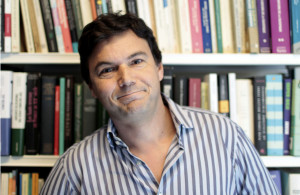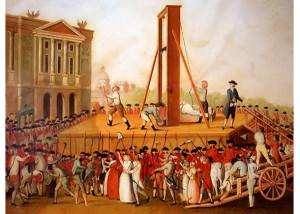
Hey guys. On Tuesday I gave a TED talk, a speech “In Defense of Capitalism” at TEDxFultonStreet, one of thousands of smaller, indie spinoffs of the renowned speaker confab that draws millions of YouTube fans.
Thanks to organizer Aaron Sylvan for the gig, letting me have a say notwithstanding my lack of any major-media affiliation for the first time in three decades. My only regret is that the speech itself, which I will post when it goes up online, doesn’t live up to the words I wrote, which I now present here.
It’s time we started defending capitalism in this country, and celebrating the drive to get rich. For me, this speech is the start of something more.
I WANT TO SPEAK TODAY IN DEFENSE OF CAPITALISM…
Lately you would think capitalism is the scourge of society. It’s the bad guy in every story line—even the Lego movie. Corporations are rapacious and evil. CEO’s are greed-heads.
Suddenly the wealth gap is the crisis du jour. Our leaders imply that the rest of us have less… because the top 1% have so much more.
It just isn’t true. And I worry that America, the Land of Opportunity, is becoming the Land of Envy, where the haves are targets for the resentment and scorn of the rest of us.
Capitalism has many enemies these days—President Obama, Sen. Warren, Mayor DeBlasio, Pope Francis, not to mention climate-change fearmongers, radical Islam and the mainstream media. But the new superstar is Thomas Piketty, French economist and author of the capitalist-bashing tome, “Capital in the Twenty-First Century.”
It’s a New York Times best-seller for seven weeks, on course to set a new record for books that many people buy, but which almost no one ever reads.
The persnickety Doctor Piketty spent a decade researching 250 years of economic data. Took him 685 pages to say this:
“Capitalism Bad.”
May as well have been the title.
So his solution is a global tax on wealth that would raise over two trillion dollars a year. To do what? Spend it on government programs that have failed for 50 years?
The U.S. has spent sixteen trillion dollars on anti-poverty programs since LBJ declared war on poverty in 1964. Back then, 23% of children were living in poverty. Today, it’s 22%. And we’ve made four generations of families dependent on government handouts.
Where is the morality in that?
Capitalism hasn’t failed the poor—government has.
Capitalism is saving the world. It’s is giving people freedom.
Capitalism… is our only hope.
And I say this even though, growing up, I might have had reason to resent capitalism and wealth. I was raised in Hialeah, Fla. My father left when I was 12, and I can remember my mom switching to brown-bag lunches for me to not have to spend 35 cents a day in the school cafeteria.
My father tried to start a carpet-cleaning business, but it fizzled. A short time later he died very suddenly. He was 35 years old. It was the morning of my 14th birthday.
My father had purchased life insurance—$175,000 in today’s dollars. But his mother kept it for herself. She bought a Cessna.
Around that time, I got my first paying job, with my Grandpa Olinger. He had his own business, a tropical fish farm in South Miami. In the hot, summer sun, he had me shoveling out snails from concrete pools that he had built, brick by brick, all by himself.
He paid me 50 cents an hour. I bargained for more, but he wouldn’t budge. He couldn’t afford it: Asian importers were undercutting his business with mollies-on-the-cheap. Ultimately they put him out of business. That’s capitalism.
Then came my career as a business journalist—
The Wall Street Journal, then Forbes, then CNBC, then Fox Business Network. And I saw how much good capitalism does in the world. And how resilient it can be.
When I joined Forbes magazine in 1998, capitalism was in full bloom. The dotcom bubble was still inflating. Every startup seemed headed for greatness.
I still miss the great icons of that era.
And for the first time, I felt the exhilaration of stock options. Forbes gave me 30-thousand of ’em. If our website went public, I might score several hundred thousand dollars.
Liking that.
Then came the crash: The Internet bubble burst in 2000. Hundreds of companies went bankrupt, tens of thousands of people lost their jobs. My options were worthless.
But it wasn’t over: Capitalism endures, rebuilding occurs, new fortunes are created. And stock prices regain what they lost and go up from there.
In 2007, stocks peaked again as I joined CNBC—and within a year we went through the scariest financial meltdown of our lifetime.
So scary that a lot of people lost faith in capitalism and looked to government as our only savior.
Yet government was every bit as responsible as Wall Street for all that went wrong—and government today is a big drag on our recovery.
Capitalism isn’t the problem: How government handles capitalism is the problem.
The meltdown of ’08 was the result of a bipartisan effort in Washington to stoke “the dream of home ownership.” But it ended up hurting the poor.
Now that’s immoral to me: handing government-subsidized loans to entice the poor into buying homes they can’t afford. Yet the Obama Administration just took new steps to make it easier for poor, high-risk buyers to get mortgages. This will end badly.
The enemies of capitalism are much more interested, though, in pounding down the top than in lifting the bottom. Take Thomas Piketty… please!
He is distressed that the top 10% of earners in the U.S. control 50% of the wealth, the highest since 1930. And he says this will get only worse, because the profits on capital—stocks and bonds and such—are growing faster than the economy over all.
And only the rich own capital.
He’s also upset that CEO’s are paid so much. Though he devotes not a single word to the Yankees’ paying a-rod $20 million dollars a year to choke in the playoffs.
And implicit in this French lament is a dark warning: that if the rich don’t fork over a bigger share of their wealth, the masses will revolt. Gee, I wonder where he got that idea?
Thomas Piketty, born and bred in France, land of the guillotine, where at the end of the 18th century, some 13,000 aristocrats lost their heads.
So to keep ours, Piketty proposes a worldwide tax on wealth—let’s skim 2% of the accumulated wealth owned by the top 1% of the world, every year.
That would amass $2.2 trillion dollars per year.
Oh, and let’s levy income tax rates as high as 80% after certain thresholds. That’ll equalize ’em!!!
But some prominent pundits question the Piketty premise. Some economists say he ignores that the wider wealth gap is a temporary spike caused by the plunge in home prices. And the Financial Times found “little evidence” in his sources to support his thesis.
Plus, he focuses more on the U.S. and Europe, when capitalism is doing its greatest work in the developing world. It has lifted hundreds of millions of people out of stark poverty in the past decade. In the some of the poorest parts of the world: China, India, Vietnam.
The continent of Africa is next. That’s capitalism.
Around the world, 1.8 billion people are middle-class. In six years that will grow to over 3 billion, up 77%. By 2030, 5 billion people will be in the middle—-nearly two-thirds of all the people in the world.
So, what is your problem, Dr. Piketty?
In fact, studies show that a big gap between high and low earners drives more economic growth in nations with per-capita income above $2,000 dollars a year—that’s 158 countries.
But even if Piketty is right, should we even care that the rich are getting richer?
Even in communist China, Deng Xiaoping is credited with saying: “To get rich is glorious.”
But in America, getting rich now is a moral dilemma: as if you should feel guilty for even wanting that. Yet it is that very desire to get rich that drives the American dream and makes the U.S. the most vibrant, innovative economy in the world.
In America, we should be proud to get rich. And happy for those who get even richer.
America does all it can to guarantee equal opportunity. But we do not guarantee equal outcome. That part is up to you.
My fear is what comes next: If we believe the top 1% got rich by screwing the rest of us… it justifies our government seizing wealth from those it deems as being too rich.
And that definition keeps moving downward. When the income tax began in 1913, the top rate was 7% on earnings over $12 million. Now it’s 40% and only half a million dollars. They’re coming after your wealth, next.
All those taxes… so government can fund more failure.
Now why isn’t that immoral? Handing out money to able-bodied people who haven’t earned it. Encouraging a sense of entitlement among the idle. Helping them make ends meet—instead of giving them a leg up to help them earn it themselves.
The feds pay jobless benefits for almost two years, though the recession ended five years ago. We have almost 50 million people on food stamps—-and the government airs cutesy radio ads urging even more people to sign up.
We now pay claims for easy-to-fake mental disability and back pain at more than double that rate before President Obama took office.
It’s all such a distraction from what we really need: to free up businesses to grow and invest. And create new jobs that can lift the poor and the unemployed.
The poor aren’t poor because the rich got richer, and they aren’t poor because they work in jobs that don’t pay enough.
The poor are poor… because they don’t have jobs at all. Only 3% of people with full-time jobs live at the poverty level. But over 90% of people at the poverty line are unemployed. That’s why they’re poor.
The answer is more capitalism—more, not less.
If profits on capital are so great, let’s find ways for the rank-and-file to own capital, too. Give companies new tax breaks to set up bigger, more generous stock-ownership-plans for employees. Let businesses go tax-free for 10 years when they set up in depressed areas, and do the same for the employees who work and live there.
Also, let businesses to train unskilled workers and write-off two times the cost of training them for two years. And three times the cost when companies hire a person off of welfare.
When I was the managing editor of Forbes magazine, I coined a geeky slogan:
“Capitalism is optimism monetized.” It’s about hope. And hope… is a decision. Undermine capitalism, and you undermine hope. And economic growth. And freedom.
Capitalism is a distinctly American export that will save the world if we let it. It can’t benefit everyone—nothing can. But it is the best chance we’ve got to lift up the poor.
And shouldn’t that be our paramount concern? Not how rich our neighbors are getting? Government failed the poor—give more capitalism a chance.